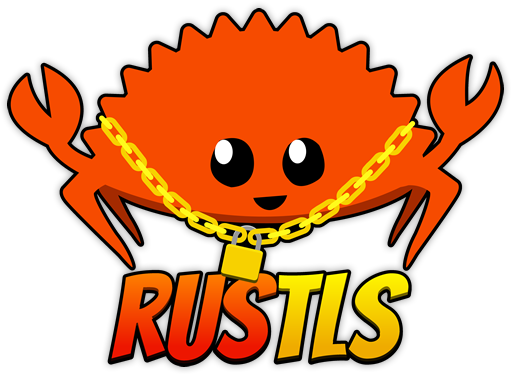

Rustls is a modern TLS library written in Rust. It uses ring for cryptography and webpki for certificate verification.
# Status Rustls is ready for use. There are no major breaking interface changes envisioned after the set included in the 0.20 release. If you'd like to help out, please see [CONTRIBUTING.md](CONTRIBUTING.md). [](https://github.com/rustls/rustls/actions/workflows/build.yml?query=branch%3Amain) [](https://codecov.io/gh/rustls/rustls/) [](https://docs.rs/rustls/) [](https://discord.gg/MCSB76RU96) ## Release history * Next release - Planned: removal of unused signature verification schemes at link-time. * 0.20.8 (2023-01-12) - Yield an error from `ConnectionCommon::read_tls()` if buffers are full. Both a full deframer buffer and a full incoming plaintext buffer will now cause an error to be returned. Callers should call `process_new_packets()` and read out the plaintext data from `reader()` after each successful call to `read_tls()`. - The minimum supported Rust version is now 1.57.0 due to some dependencies requiring it. * 0.20.7 (2022-10-18) - Expose secret extraction API under the `secret_extraction` cargo feature. This is designed to enable switching from rustls to kTLS (kernel TLS offload) after a successful TLS 1.2/1.3 handshake, for example. - Move filtering of signature schemes after config selection, avoiding the need for linking in encryption/decryption code for all cipher suites at the cost of exposing more signature schemes in the `ClientHello` emitted by the `Acceptor`. - Expose AlertDescription, ContentType, and HandshakeType, SignatureAlgorithm, and NamedGroup as part of the stable API. Previously they were part of the unstable internals API, but were referenced by parts of the stable API. - We now have a [Discord channel](https://discord.gg/MCSB76RU96) for community discussions. - The minimum supported Rust version is now 1.56.0 due to several dependencies requiring it. * 0.20.6 (2022-05-18) - 0.20.5 included a change to track more context for the `Error::CorruptMessage` which made API-incompatible changes to the `Error` type. We yanked 0.20.5 and have reverted that change as part of 0.20.6. * 0.20.5 (2022-05-14) - Correct compatbility with servers which return no TLS extensions and take advantage of a special case encoding. - Remove spurious warn-level logging introduced in 0.20.3. - Expose cipher suites in `ClientHello` type. - Allow verification of IP addresses with `dangerous_config` enabled. - Retry I/O operations in `ConnectionCommon::complete_io()` when interrupted. - Fix server::ResolvesServerCertUsingSni case sensitivity. * 0.20.4 (2022-02-19) - Correct regression in QUIC 0-RTT support. * 0.20.3 (2022-02-13) - Support loading ECDSA keys in SEC1 format. - Support receipt of 0-RTT "early data" in TLS1.3 servers. It is not enabled by default; opt in by setting `ServerConfig::max_early_data_size` to a non-zero value. - Support sending of data with the first server flight. This is also not enabled by default either: opt in by setting `ServerConfig::send_half_rtt_data`. - Support `read_buf` interface when compiled with nightly. This means data can be safely read out of a rustls connection into a buffer without the buffer requiring initialisation first. Set the `read_buf` feature to use this. - Improve efficiency when writing vectors of TLS types. - Reduce copying and improve efficiency in TLS1.2 handshake. * 0.20.2 (2021-11-21) - Fix `CipherSuite::as_str()` value (as introduced in 0.20.1). * 0.20.1 (2021-11-14) - Allow cipher suite enum items to be stringified. - Improve documentation of configuration builder types. - Ensure unused cipher suites can be removed at link-time. - Ensure single-use error types implement `std::error::Error`, and are public. See [RELEASE_NOTES.md](RELEASE_NOTES.md) for further change history. # Documentation Lives here: https://docs.rs/rustls/ # Approach Rustls is a TLS library that aims to provide a good level of cryptographic security, requires no configuration to achieve that security, and provides no unsafe features or obsolete cryptography. ## Current features * TLS1.2 and TLS1.3. * ECDSA, Ed25519 or RSA server authentication by clients. * ECDSA, Ed25519 or RSA server authentication by servers. * Forward secrecy using ECDHE; with curve25519, nistp256 or nistp384 curves. * AES128-GCM and AES256-GCM bulk encryption, with safe nonces. * ChaCha20-Poly1305 bulk encryption ([RFC7905](https://tools.ietf.org/html/rfc7905)). * ALPN support. * SNI support. * Tunable fragment size to make TLS messages match size of underlying transport. * Optional use of vectored IO to minimise system calls. * TLS1.2 session resumption. * TLS1.2 resumption via tickets ([RFC5077](https://tools.ietf.org/html/rfc5077)). * TLS1.3 resumption via tickets or session storage. * TLS1.3 0-RTT data for clients. * TLS1.3 0-RTT data for servers. * Client authentication by clients. * Client authentication by servers. * Extended master secret support ([RFC7627](https://tools.ietf.org/html/rfc7627)). * Exporters ([RFC5705](https://tools.ietf.org/html/rfc5705)). * OCSP stapling by servers. * SCT stapling by servers. * SCT verification by clients. ## Possible future features * PSK support. * OCSP verification by clients. * Certificate pinning. ## Non-features For reasons [explained in the manual](https://docs.rs/rustls/latest/rustls/manual/_02_tls_vulnerabilities/index.html), rustls does not and will not support: * SSL1, SSL2, SSL3, TLS1 or TLS1.1. * RC4. * DES or triple DES. * EXPORT ciphersuites. * MAC-then-encrypt ciphersuites. * Ciphersuites without forward secrecy. * Renegotiation. * Kerberos. * Compression. * Discrete-log Diffie-Hellman. * Automatic protocol version downgrade. There are plenty of other libraries that provide these features should you need them. ### Platform support Rustls uses [`ring`](https://crates.io/crates/ring) for implementing the cryptography in TLS. As a result, rustls only runs on platforms [supported by `ring`](https://github.com/briansmith/ring#online-automated-testing). At the time of writing this means x86, x86-64, armv7, and aarch64. Rustls requires Rust 1.56 or later. # Example code There are two example programs which use [mio](https://github.com/carllerche/mio) to do asynchronous IO. ## Client example program The client example program is named `tlsclient-mio`. The interface looks like: ```tlsclient-mio Connects to the TLS server at hostname:PORT. The default PORT is 443. By default, this reads a request from stdin (to EOF) before making the connection. --http replaces this with a basic HTTP GET request for /. If --cafile is not supplied, a built-in set of CA certificates are used from the webpki-roots crate. Usage: tlsclient-mio [options] [--suite SUITE ...] [--proto PROTO ...] [--protover PROTOVER ...]